Related Research Articles

John Howard Jones is a British musician, singer and songwriter. He had ten top 40 hit singles in the UK between 1983 and 1986, six of which reached the top ten, including "Like to Get to Know You Well", "What Is Love?", "New Song", and "Things Can Only Get Better". His 1984 album Human's Lib reached number one on the UK Albums Chart. Around the world, Jones had 15 top 40 hit singles between 1983 and 1992. The 1986 hit single "No One Is to Blame" reached No. 4 on the US charts. Four others placed in the US top 20.

The Icicle Works are an English alternative rock band, named after the 1960 short story "The Day the Icicle Works Closed" by science fiction author Frederik Pohl. They had a top 20 UK hit with "Love Is a Wonderful Colour" (1983). In the US and Canada, they had one top 40 hit, the 1984 single "Birds Fly ".

"Lovesong" is a song by English rock band the Cure, released as the third single from their eighth studio album, Disintegration (1989), on 21 August 1989. The song saw considerable success in the United States, where it reached the number-two position in October 1989 and became the band's only top-10 entry on the Billboard Hot 100. In the United Kingdom, the single charted at number 18, and it peaked within the top 20 in Canada and Ireland.

"Master and Servant" is a song by the English electronic music band Depeche Mode, released on 20 August 1984 as the second single from their fourth studio album, Some Great Reward (1984). Its subject matter is BDSM relationships, which caused some controversy, though it has an underlying political theme that is often overlooked by media. It reached number 9 on the UK Singles Chart, number 49 on the US Hot Dance Club Songs chart and number 87 on the US Billboard Hot 100.

"Love Is a Stranger" is a song by the British pop duo Eurythmics. Originally released in late 1982, the single was commercially unsuccessful, but it was re-released in 1983, reaching the UK top 10. The single was re-released again in 1991, to promote Eurythmics' Greatest Hits album.
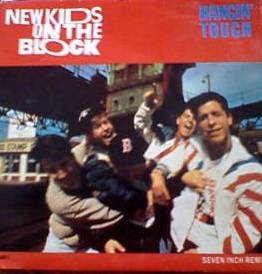
"Hangin' Tough" is a song by American boy band New Kids on the Block, released as a single in 1989 through Columbia Records. It was the fourth single from the group's second album of the same name (1988). The lead vocals are sung by Donnie Wahlberg.

"Freak like Me" is a song by American R&B singer Adina Howard, released on January 25, 1995 by East West and Lola Waxx, as the debut single from her first album, Do You Wanna Ride? (1995). The song reached number two on the US Billboard Hot 100 for two weeks, as well as number two on the Billboard Hot R&B Singles chart for four weeks, and was certified platinum by the Recording Industry Association of America (RIAA) for sales of one million copies. Its music video was directed by Hype Williams. In 2023, Billboard ranked "Freak like Me" among the "500 Best Pop Songs of All Time". The song has been covered by several artists, most notably by British girl group Sugababes, who reached number one on the UK Singles Chart with their version in 2002.

"Until You Come Back to Me (That's What I'm Gonna Do)" is a song written by Morris Broadnax, Clarence Paul, and Stevie Wonder. The song was originally recorded by Stevie Wonder in 1967, but his version was not released as a single and did not appear on an album until 1977's anthology Looking Back. The best-known version of this song is the 1973 release by Aretha Franklin, who had a million-selling top 10 hit on Billboard charts. The song reached No. 1 on the R&B chart and No. 3 on the Hot 100 chart in 1974. It became an RIAA Gold record.

"Burning Down the House" is a song by new wave band Talking Heads, released in July 1983 as the first single from their fifth studio album Speaking in Tongues.

Cross That Line is the fourth album by British pop musician Howard Jones, released in March 1989. It featured two hit singles "The Prisoner" and "Everlasting Love", though neither of these singles nor the album itself were successful in Jones's native UK.
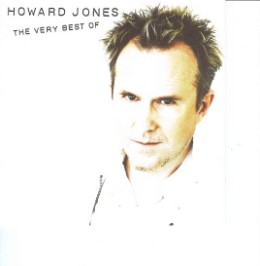
The Very Best of Howard Jones is a collection of Howard Jones's biggest hits between 1983 and 2003. It also contains one new track, "Revolution Of The Heart", in its original form. It would later be altered and featured on his 2005 album, Revolution Of The Heart. The Very Best of Howard Jones also came with a bonus disc of B-sides. The two-disc set featuring 36 synth-pop hits includes "New Song," "Everlasting Love," and the Phil Collins-produced version of "No One Is To Blame."
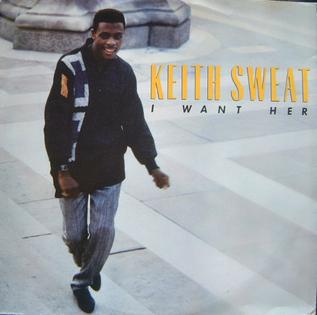
"I Want Her" is a song by American R&B singer Keith Sweat. As the first single from his debut album, Make It Last Forever, it reached number five on the Billboard Hot 100 and number one on the Hot R&B/Hip-Hop Singles & Tracks chart for three weeks. and became the most successful number one single of 1988 on the Billboard Hot R&B chart. "I Want Her" also peaked at number 38 on the dance chart. The song topped the R&B Billboard Year-End chart for 1988. It was ranked number 6 on complex.com's list of 25 best new jack swing songs of all time.

"Pull Up to the Bumper" is a 1981 song by Jamaican singer, songwriter, model and actress Grace Jones, released by Island Records as the third single from her fifth album, Nightclubbing (1981). Sonically, it is an uptempo electro-disco, post-punk, dance-pop and reggae-disco song with dub production, "pulsing drums and chic new-wave licks", as well as elements of funk and R&B music. Its lyrics were written by Jones alone, while she, along with Kookoo Baya and Dana Manno, are credited as its composers. The song's instrumental part was originally recorded in 1980 during the Warm Leatherette sessions; however, it did not make the album as Chris Blackwell found its sound not fitting in the rest of the material. It was completed for the 1981 critically acclaimed Nightclubbing album and became its third single in June 1981. The song peaked at number two on the US Billboard Hot Dance Club Songs chart and number 53 on the UK Singles Chart. When re-released in 1986, it peaked at number 12 in the UK. The track has come to be one of Jones' signature tunes and her first transatlantic hit.
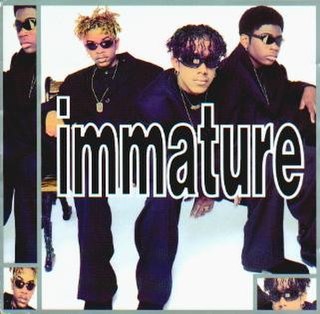
We Got It is the third album by R&B boy band Immature that was released on December 5, 1995. The album featured singles "We Got It", "Please Don't Go", "Lover's Groove" and "Feel the Funk".
The Best of the Art of Noise is the name of a series of compilation albums with songs by British synth-pop band Art of Noise. The first version was released on the China Records label in November 1988.

"Amado Mio" is a song from the classic 1946 film noir Gilda, written by Doris Fisher and Allan Roberts. The piece was lip-synched by Rita Hayworth and sung by Anita Kert Ellis. Grace Jones's rendition of the song on her 1989 album Bulletproof Heart was released as a single in a special "Brazilian Mix" in 1990. It became a significant dance hit in the US.
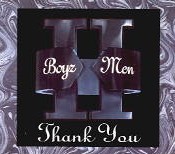
"Thank You" is a new jack swing song by American R&B/soul group Boyz II Men, released as the third single from their second studio album, II (1994). The song was co-produced by Dallas Austin and Boyz II Men. It did not perform as well as its predecessor and reached a peak position of #21 on the US Billboard Hot 100 and the Hot Singles Sales on March 18, 1995, and March 25, 1995, respectively, and also reached #17 on the US Billboard Hot R&B/Hip-Hop songs. "Thank You" performed moderately well in the UK eventually peaking at #26 on the UK Singles Chart. The song also peaked at #17 on the New Zealand RIANZ singles chart, #27 on the French singles chart and #33 on the Australian ARIA Singles Chart. The album version of the song is a cappella, consisting only of sounds created by the human voice, bringing to mind one of their first hit songs, "Motownphilly".

"No One Is to Blame" is a song written and performed by British musician Howard Jones. Originally released on Jones's 1985 album, Dream into Action, "No One Is to Blame" was re-recorded and released as a single in 1986. The single became Jones's biggest U.S. hit to date, peaking at #4.

"Everlasting Love" is a song by English singer and songwriter Howard Jones from his fourth studio album, Cross That Line (1989). Written by Jones, it was released as the album's first single on 20 February 1989.
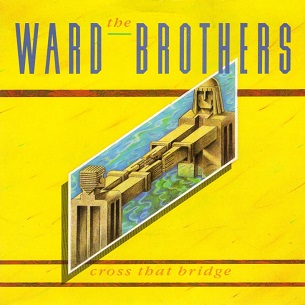
"Cross That Bridge" is a song by British pop-rock band the Ward Brothers, which was released in 1986 as the second single from their debut studio album Madness of It All. It was written by Graham Ward, and produced by Don Was and Phil Brown.
References
- ↑ Whitburn, Joel (2004). The Billboard Book of Top 40 Hits (8th Edition). Billboard Books. p. 331. ISBN 0-8230-7499-4.
- ↑ "Howard Jones: The Prisoner". AllMusic . Retrieved 17 October 2010.